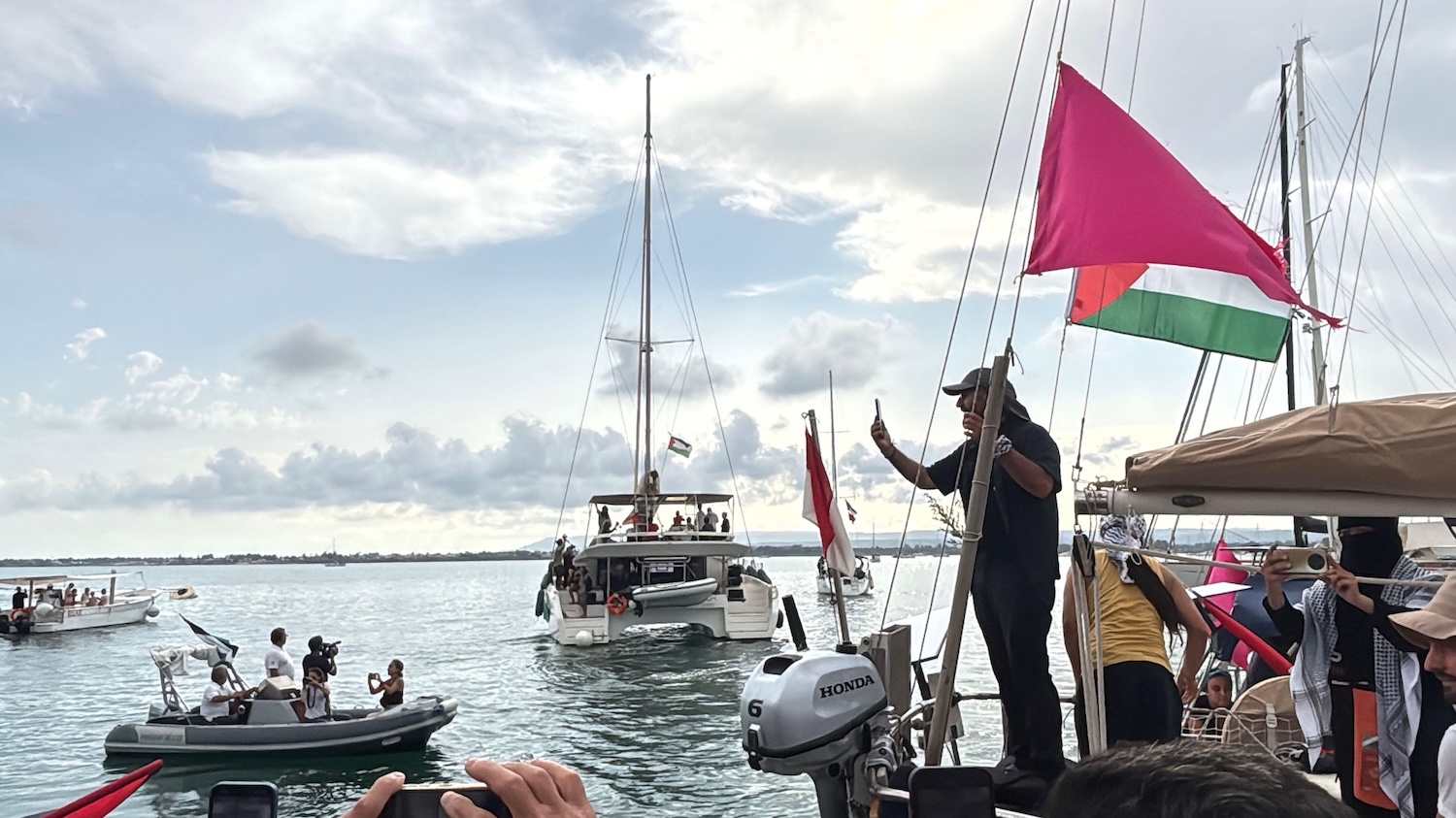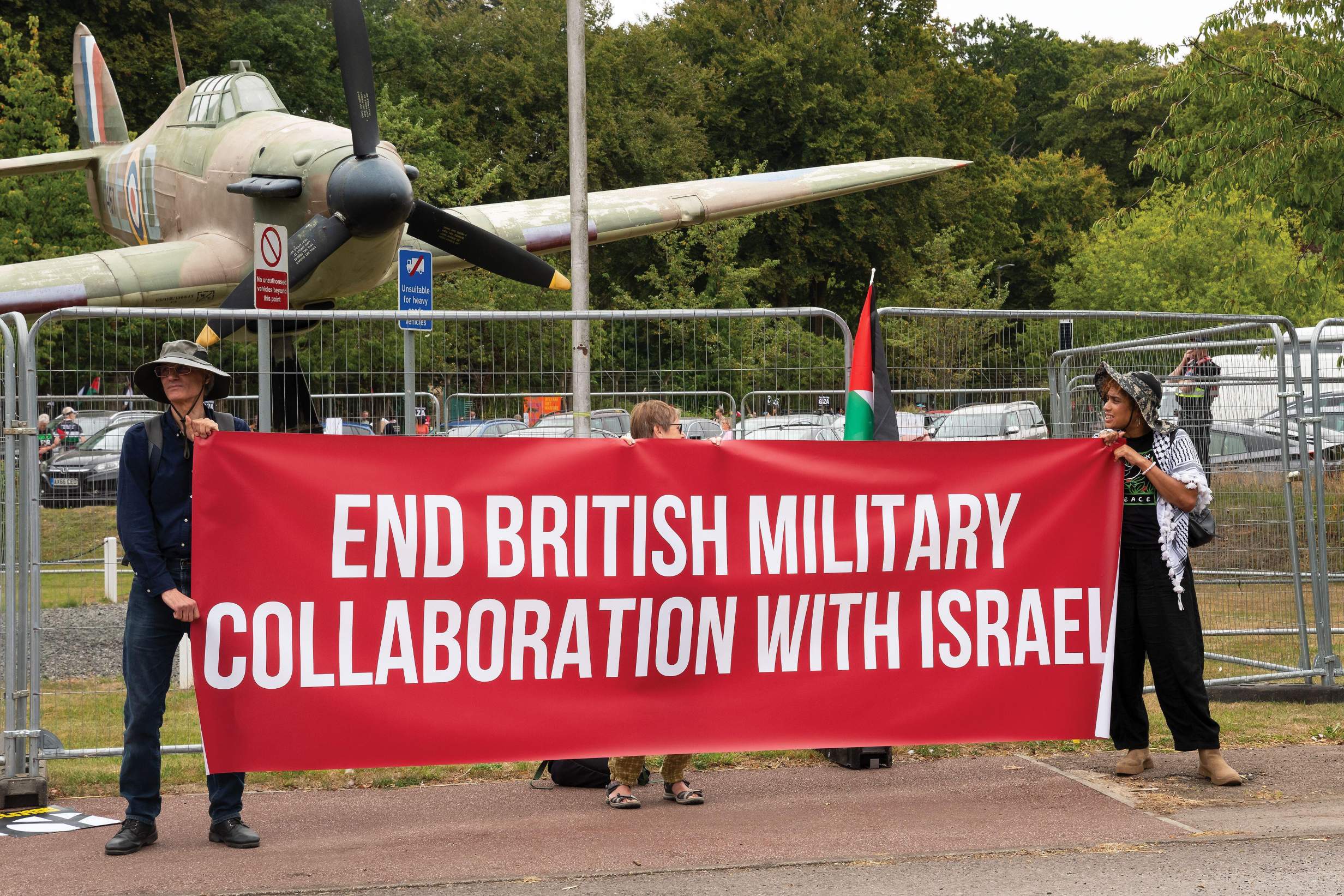
Read our Digital & Print Editions
And support our mission to provide fearless stories about and outside the media system
I am writing on board a boat you’ve probably heard of. It’s called Family Boat, and it was attacked by a drone in the early hours of Tuesday in an apparent attempt to sabotage its journey to Gaza. This is the mothership of the Global Sumud Flotilla. But I boarded in a different capacity to most of its passengers: neither as an activist, like Greta Thunberg, nor a humanitarian worker, like Miguel Duarte, but as one of a very small handful of journalists.
I can almost count on one hand the outlet-affiliated journalists present. Given the scale of this operation, set to be the biggest civilian flotilla in history attempting to open a humanitarian corridor to Gaza, I wonder why. Why don’t outlets want inside access to this monumental story? But I imagine many news outlets would disparage my presence too. They’d say that it blurs the line between journalism and activism. They’d say reporters must be objective, not partial to the activists’ mission.
There are several issues with the premises of these statements: that objectivity exists, that our media exercises it at all (in particular on the issue of Palestine), that journalism isn’t inherently activist, and that bias isn’t its worst when undisclosed. But let’s take the objections at face value.
My first response is: why shouldn’t I be here? Civilians on the flotilla are exercising their legal rights to move through international waters and deliver humanitarian aid. The fact that it’s remotely controversial reflects the absurd bias of the norm. That we have already mentally criminalised or defined as extreme the people of this movement, who are mothers and fathers and teachers and teenagers and doctors and veterans and citizens of the world. I know this, because I’ve made the effort to meet them.
As to the point of becoming partial to one ‘side’, there is fallacy around what those two sides are. The dividing line for me is not Israel versus Palestine, it’s international law and basic humanity. This civilian fleet is lawful, and Israel’s siege on Gaza is not. Don’t all journalists, in their exposés and investigations, pick a side between legal and illegal? As Melanie Schweizer, a German lawyer and flotilla spokesperson, stated: “Our governments expect us to follow the law, and we expect them to follow the law”. Besides that, there are no two clear sides present. The multitudes joining the fleet are bemusingly diverse in their political, cultural and religious identities.
Editorially speaking, the Global Sumud Flotilla is by any accounts a huge story. It amasses tens of thousands of donors, thousands of land coordinators, and hundreds of seafarers from every populated continent of the globe. But news outlets’ failure to dispatch any correspondent is unsurprising, given their systemic downplaying of public anger at Israeli crimes, by now a majority opinion across European countries.
Western media is even more obtuse when it comes to the Global South, willfully unaware that the issue of Palestine represents the greatest symbol of Western liberal hypocrisy to vast populations outside the West. I spent ten days training in Tunis for this flotilla with mostly African, Asian and Australasian volunteers. Many have tried to reach Gaza before and are used to our media’s disinterest. The same week that Thunberg sailed for Gaza on the Madleen in June, over 1,000 people joined a North African convoy moving through Tunisia, Libya and Egypt in an attempt to get aid in by land. Many were arrested and beaten in Egypt or held in captivity in Libya. This was almost unreported by Western media.
So I did not expect many news outlets to be on board. But I was shocked by their absence on the second consecutive night of drone attacks while the flotilla was moored in Tunis earlier this week. Many diminished the veracity of the first attack. The BBC appear not to have bothered to send anyone to check, but chose to report the strike as a “claim” made by “activists”, alongside equally-weighted denials by the Tunisian Government. Bear in mind, these attacks are an embarrassing and pressurising security breach for them. I, however, can tell you it was a drone attack because I was on-site immediately to do my job. I have spoken in depth with multiple witnesses, and I’m currently looking at the rubble of the strike. The Tunisian coastguard accompanied our boat yesterday in anticipation of another attack. But Western news media don’t know that because they are not here.
The two drone attacks on two flotilla ships this week indicate a particular need for journalists to be present. The history of such aid missions through Israel’s siege teaches that violent attack on civilians is possible, and illegal interception in international waters highly likely. As with frontline reporting and war correspondence, journalists must sometimes put themselves at risk in order to show the world difficult truths, and to document evidence for the sake of accountability. There is also an independent legal observation ship coming for this purpose.
ENJOYING THIS ARTICLE? HELP US TO PRODUCE MORE
Receive the monthly Byline Times newspaper and help to support fearless, independent journalism that breaks stories, shapes the agenda and holds power to account.
We’re not funded by a billionaire oligarch or an offshore hedge-fund. We rely on our readers to fund our journalism. If you like what we do, please subscribe.
This need is particularly acute when it comes to scrutinising Israel’s behaviour, because Israel is levelling Gaza City to the ground as I write, while banning international journalists from the field. Meanwhile, they have slaughtered Palestinian journalists. I may not be an activist in the sense of my other travellers, but I too have eyes. I too have seen genocide live-streamed and rationalised by media and government officials. I too am confused by what is happening behind the scenes that means leaders do neither what their people want nor what their consciences surely advise. I too do not want to do nothing.
A war reporter spoke to us during my journalism MA at City, University of London. I sadly don’t remember her name or outlet, but I starkly remember her words: “there isn’t a line between journalism and activism because journalism is inherently activist”. Of course this is the case: any journalist is at war with falsehood, silence and unaccountability. I chose the profession because I considered what role I could best play for the wider cause of justice and social wellbeing. The answer was journalism, and it put me on this boat. It should have others here with me.

